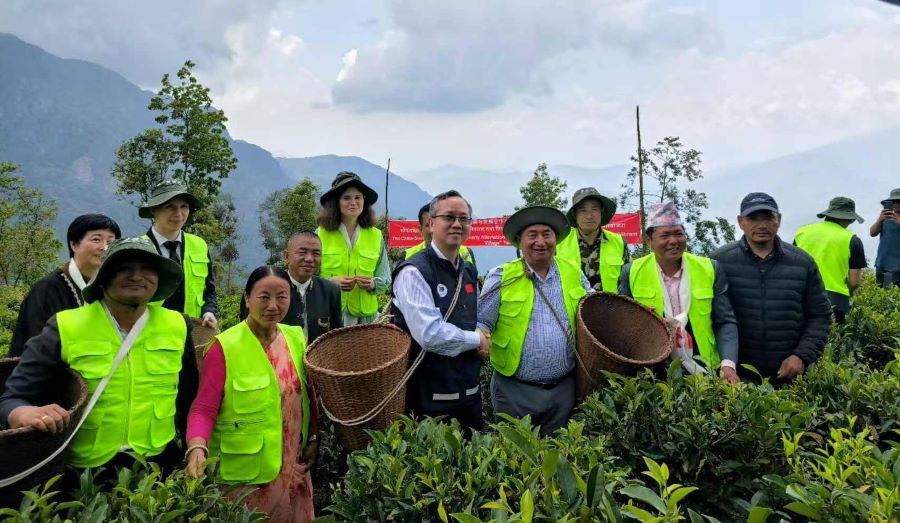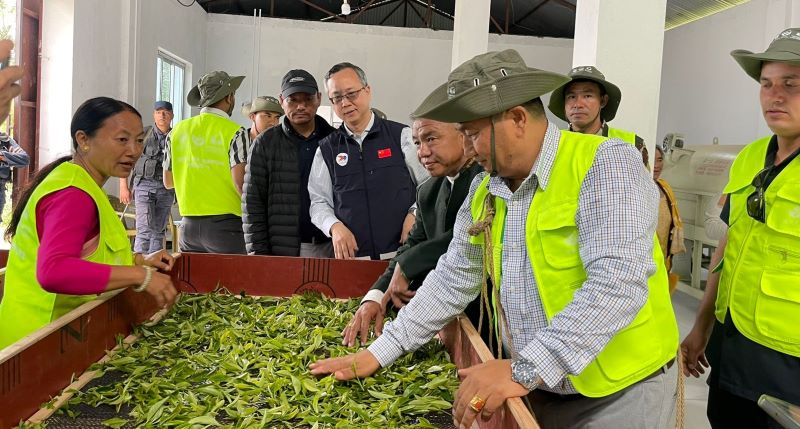China-Supported Tea Project Handed Over to Local Cooperative

Nuwakot . A newly constructed tea factory, supported by the China Foundation for Rural Development (CFRD), one of “Vibrant Village” project supported by Chinese people in Nuwakot, has been officially handed over to the local tea cooperative for operation and management.
Ambassador of the People’s Republic of China to Nepal, His Excellency Chen Song, presented the “Vibrant Village” plaque to the Chairman of the Kimtang Village Tea Cooperative Mr. Sarman Tamang, where the project is located, marking the formal transfer of the facility. The ceremony was attended by the Chief Minister of Bagmati Province Honorable Bahadur Singh Lama, Ambassador of the People’s Republic of China to Nepal His Excellency Chen Song, Member of the Province Policy and Planning Commission of Bagmati Province Honorable Dr. Dipendra Shrestha, Country Director of CFRD Nepal Office Ms. Zou Zhiqiang, Chairperson of Myagang Rural Municipality Mr. Aasha Tamang, Chief District Officer of Nuwakot District Mr. Shashidhar Ghimire, Chief of District Police Office Nuwakot Superintendent of Police Mr. Durga Raj Regmi Former, Executive Director of National Tea and Coffee Development Board Dr. Bishnu Prasad Bhattarai, Chairperson of Ward no. 4 of Myagang Rural Municipality Mr. Kamal Bahadur Tamang, Chairperson of Global Cooperation for Development Mr. Mukti Marasini, Chairperson of Kimtang Organic Tea Cooperative Mr. Sarman Tamang, farmers, community people, and nearly 100 local people and villagers participated in the ceremony. Local children performed songs and dances to express their gratitude and affection for the Chinese people.
Under the ‘Vibrant Village’ initiative of the China-South Asian Countries Poverty Alleviation and Development Cooperation Center, the China Foundation for Rural Development (CFRD) has successfully implemented two tea assistance workshops as part of poverty alleviation projects in Myagang Rural Municipality of Nuwakot district and Mahankal Rural Municipality of Lalitpur district, aiming to revitalize rural development in Nepal. Through this project, a fully equipped Tea Processing Factories have been established. With the support of Chinese tea machinery, Nepali cooperative tea farmers were taken to China to learn tea picking, processing, and marketing techniques. Chinese tea experts also visited Nepal to provide on-site guidance. A series of trainings were conducted to increase the added value of local fresh tea leaves, improve tea quality standards, and help Nepali tea farmers expand access to Chinese and international markets. Since its launch, the project has boosted local tea production. Through learning and training in China, tea farmers have gained greater confidence in the potential of Nepali tea. The long-term vision of the project is to transform Nuwakot into a high-yield tea production hub in northern Nepal, comparable to Ilam in the east.
During his speech at the ceremony, Honorable Bahadur Singh Lama, Chief Minister of Bagmati Province, stated that the handover of the two tea assistance workshops holds great significance for the development of three provinces in Nepal. He emphasized that the project is a result of the joint efforts of the peoples of China and Nepal.
Chief Minister Lama noted that the project has not only enhanced tea production in Nuwakot and Lalitpur districts but has also established a replicable model of Chinese poverty alleviation assistance in Nepal. He expressed confidence in the project's future development, stating that it provides a valuable blueprint for sustainable industrial development in the region.
During the handover ceremony, Chinese Ambassador to Nepal H.E. Chen Song presented the project board to the tea cooperative, symbolizing the official launch of the tea assistance project and marking another achievement in the joint efforts of China and Nepal to promote rural and sustainable development in Nepal. In his speech, Ambassador Chen Song emphasized that the implementation of this project represents an effort to apply China's rural development and poverty alleviation experience in Nepal. It also reflects the Chinese people’s contribution to Nepal’s sustainable development. He noted that agriculture is a crucial part of Nepal’s economic development, and there are many valuable lessons from China’s agricultural development that can be shared. He highlighted that under the “Vibrant Village” initiative, various supports have already been provided, such as rice cultivation assistance and vegetable farming support in Dakshinkali Municipality under China’s sustainable development efforts. Future plans include support for buffalo and fish farming. These initiatives aim to inspire sustainable development in Nepal through China’s industrial development model.
Ambassador Chen expressed his hope that the “CFRD Vibrant Village – Tea Assistance Workshop Project” would genuinely help increase the income of Nepali tea farmers and enhance Nepal’s influence in the international tea market. He concluded by stating that the completion of this project is the result of joint efforts by the peoples of both countries, and he looks forward to seeing its early success as a model of China’s poverty alleviation experience being effectively implemented in Nepal.

Ms. Zou Zhiqiang, Country Director of the China Foundation for Rural Development (CFRD) Nepal Office, expressed her heartfelt thanks to all the distinguished guests who made the effort to travel to the 2,000-meter-high tea mountain to attend the handover ceremony of the China Tea Assistance Workshop and the plaque unveiling ceremony of the China-South Asia Poverty Alleviation and Development Cooperation Center's "Vibrant Village" initiative.
She emphasized that, with the support of the Chinese government and people, the CFRD is actively implementing President Xi Jinping's call to “Join hands in building a world free from poverty and filled with shared prosperity and beauty.” Through various agricultural and industrial development projects—including the promotion of vegetable cultivation, buffalo farming, aquaculture, and hybrid rice initiatives—the CFRD is working to apply China's agricultural and industrial development experience in rural Nepal.
After the ceremony, the attending guests visited the local tea plantations, where they personally participated in tea picking and processing. They also observed the tea production process at the workshop, where local farmers were using Chinese machinery for tea processing. This was a great encouragement to the local tea cooperatives and farmers.
The local tea farmers expressed their determination to seize this valuable opportunity provided by the China Foundation for Rural Development to enhance their tea production capacity and improve the quality of their tea products. They aim to lead the region out of poverty and transform it into a significant tea production hub in Nepal.















प्रतिकृया दिनुहोस